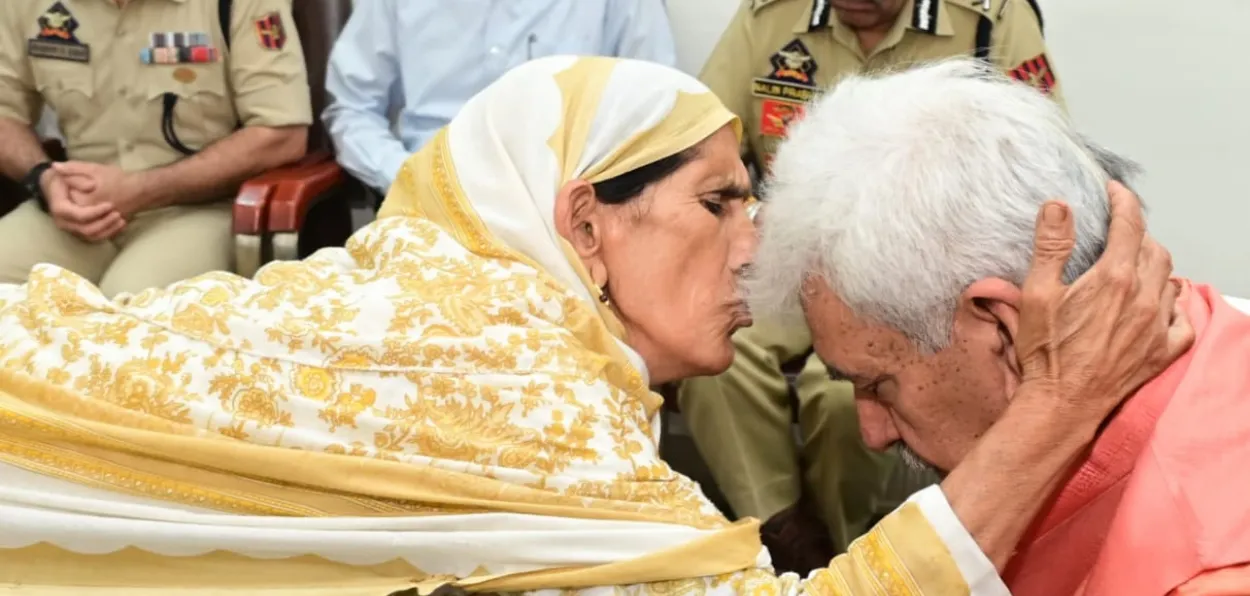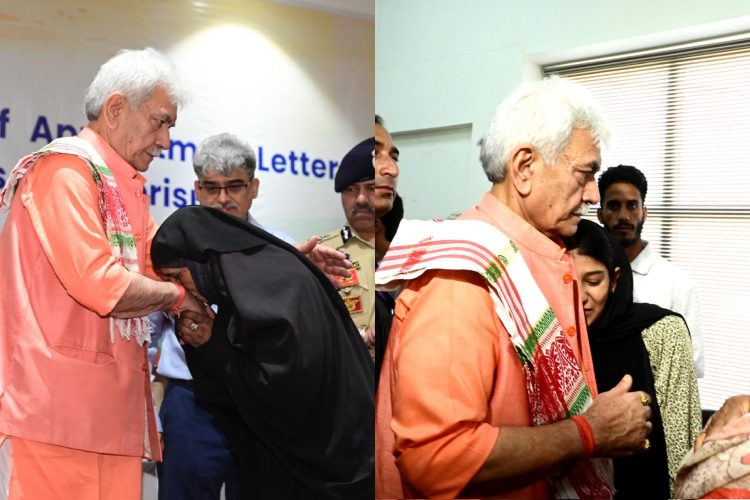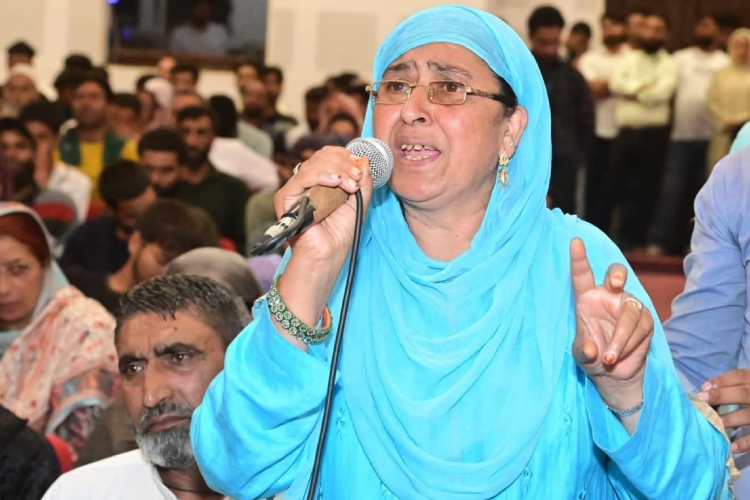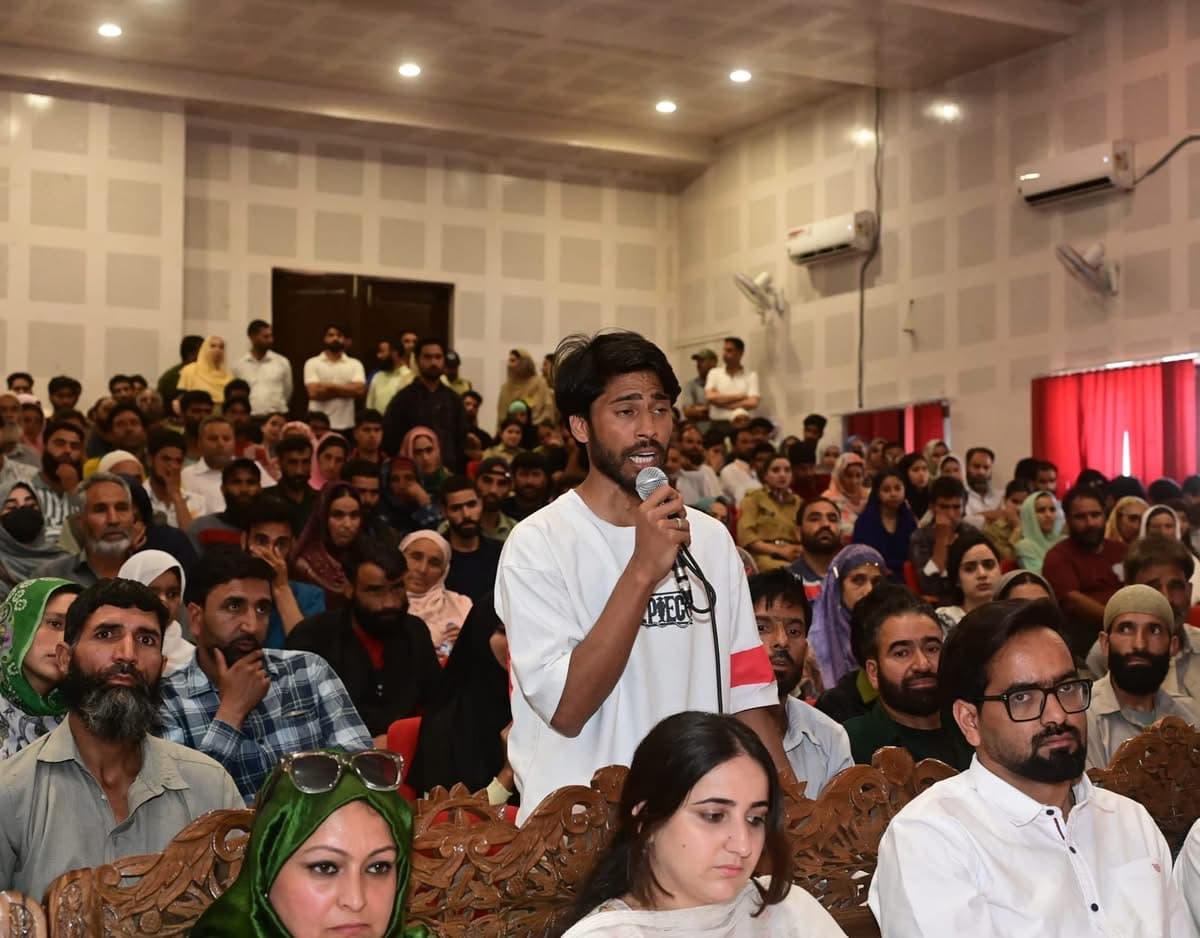
You must have heard about 3.5 lakh Kashmiri Pandits (Hindus) being driven away from their homeland by terrorists, but rarely about hundreds of Kashmiri Muslim victims of the same terrorists who too became homeless, and were pushed into living with shame, guilt, and confused identity topped by the apathy of society and government.
The real winds of change are blowing in Kashmir, as, for the first time, the Kashmiri Muslims who suffered silently after losing their kin to the pro-Pakistani terrorists’ bullets, faced ostracism and indifference of authorities for nearly three decades, are being heard and taken care of.
It was a historic occasion when J&K Lt Governor Manoj Sinha distributed 40 letters of job to next of kin of victims of terrorism and heard their touching stories at a function in Baramulla, North Kashmir.
As emotions welled up, it turned out to be more than a job letter distribution ceremony. Elderly women kissed Sinha’s forehead in a gesture of blessing; another kissed his hands to show gratitude, and a young woman, overwhelmed with emotion, hugged him for the care the government was showing towards such people.
At Baramulla, a woman narrating her tragedy of losing her four family members for refusing to feed terrorists:
A woman from North Kashmir breaks down before Honourable LG @manojsinha_ her 4 family members were killed by terrorists just for refusing them food.
— Dar Mudasir (@DarMudasir10) July 13, 2025
She stood in silence for 26 years.
Her only crime? Refusing to feed terrorists who came to her home in North Kashmir. In return,… pic.twitter.com/jPQl5Zx7v0
Earlier, Sinha accompanied by high-ups in the civil administration, held an impromptu meeting with a few families who had suffered in silence. He heard their heart-wrenching stories in Anantnag, South Kashmir.
Peace activists have so far prepared a tentative list of 330 Muslim families whose kin were killed, most of them brutally, by Pakistan-backed terrorists in Kashmir.

Emotional scenes at Baramulla meet between LG Manoj Sinha and the families of terror victims
Mudasir Dar of Save the Youth Foundation said it was difficult to convince the families to speak up, for they had lost all hope and become bitter. In some cases, the terrorists have thrown the bodies of the killed people or dismembered them, and they are still trying to find those.
At Anantnag, Mohammad Ashraf, a Gujjar tribesman, told how his two brothers and uncle were hacked to death in front of his young children. The bodies were chopped and parts thrown away. In those days, it was common to label such victims as “mukhbir (informers), Gaddar (traitors), and anti-Islam.”
A Young woman narrated how her parents were shot dead before her. The neighbours and family were not allowed to conduct the last rites of the dead in many cases.
Mudasir says, "For the first time, 330 families — whose loved ones were brutally killed in the Pakistan-sponsored terrorism were brought together, heard with respect, and assured justice. These were families who had been boycotted, labeled mukhbirs and erased from public memory, simply because they stood by the nation and not the gun."
In most cases, such families left their homes to avoid the recurrence of such acts of retribution, lived in shame for something they didn’t realize, and faced loss of livelihoods and jobs.

A woman who saw terrorists kill her parents speaks up at Anantnag
In many cases, their lands were usurped by neighbours, family, or even terrorists; in many cases, FIRs were not registered.
The government soon issued orders that all Muslim families who had lost their kin to terrorists would be given government jobs and police would take action against encroachers of their lands and properties.
Mohammad Ummer Mir, of Uri, who lost his father to terrorists’ bullets said the entire system was in the hands of pro-Pakistanis and people like us had no say.
He says the jobs for the next of kin of terror victims will be a game changer, for when they get positions they will be sympathetic to others and this sentiment will percolate changing the entire ecosystem.
Dar says it’s a challenge to identify the terror victims’ families, for most of them are still living in fear and as such there is no data available. “In Anantnag district, I managed to identify 95 such families through word of mouth.”

A young Kashmiri speaking up at the Anantnag meeting with LG Sinha
The government has since set up a helpline in each district for people to come forward with their stories and claim the government's help. Also that, LG Sinha would visit each district headquarters to offer jobs to and meet the families of the terror victims.
Sinha appealed to people, “who have suffered due to terrorism to submit their applications through the helpline. Their cases will be investigated promptly,” he added.
Mudasir termed the first job letter distribution ceremony in Baramulla a moment of “national reckoning.”
“While justice has been long denied, it was finally served as tears of Pakistan.... Justice would mean a society that restores meaning and honor to what was once stripped off, and today marked the starting point for families who were forgotten.”
At Anantnag, Sinha said, "We cannot erase your pain, but we will stand with you," Sinha said, emphasizing that those who lost their lives to terrorism are the "real martyrs of our nation."
ALSO READ: We want our honour, land, and prestige back: terror victim's son Ummer Mir
He also highlighted the role of families in exposing Pakistan and its supporters within Kashmir, signaling a firm stance against terrorism in the region.
